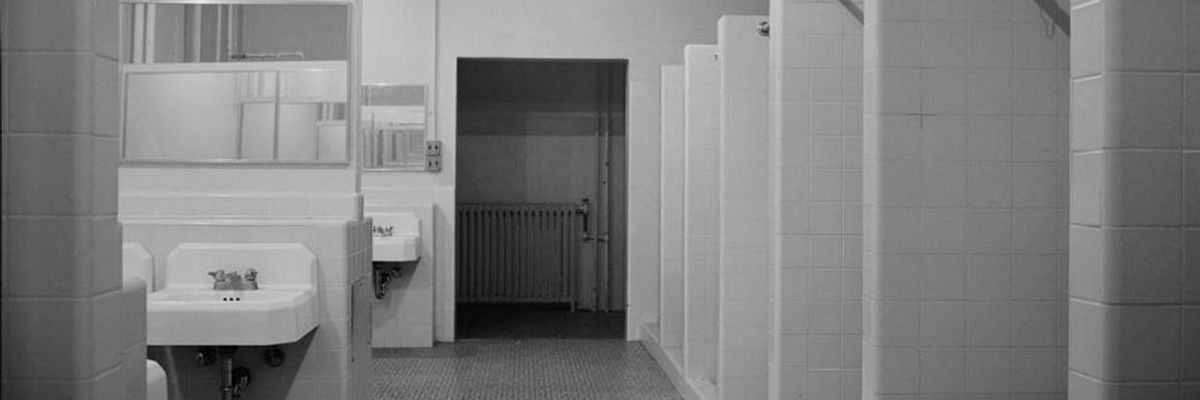If social conservatives in Tennessee get their way, the state will soon become the second in the nation to use the coercive power of the government to force people into bathrooms that violate their very sense of self or risk punishment. Legislation targeting trans students pending in both houses in the state's legislature would require public school and university students to use a bathroom or locker room that matches the sex recorded on their birth certificate. Limited-government it's not.
Tennessee legislators, though, aren't original in their bigotry. North Carolina controversially passed an even broader law in March, and at least 30 similar bills have been introduced in a total of 16 states this year alone. Proponents of these discriminatory anti-trans bathroom bills have advanced many arguments for why they are necessary. Most are absurd "urban legends." Some argue these bills are necessary to stop predatory men from dressing up as women, entering the female restroom, and then attacking unsuspecting women. The more restrained say it will stop men from just trying to sneak a peek. Not surprisingly, these are solutions in search of a problem. There is neither evidence that anyone has used the fictional "transgender defense" for illegal conduct nor reports of any increase in public safety incidents in any of the hundreds of jurisdictions that have extended legal protections to transgender people.
But let's get real, these bills aren't motivated by privacy concerns -- they're motivated by ignorance, misinformation, and fear.The argument getting the most traction, however, is the idea that compelling trans people to use the bathroom that corresponds to their assigned sex at birth protects the privacy of non-transgender boys and girls and men and women. "Letting boys into girls' restrooms and changing areas, for example, is an invasion of privacy," said Matt Sharp, a lawyer with the conservative Alliance Defending Freedom, in defense of Tennessee's bill. One of the stated purposes of Florida's defeated bill last year was "to secure privacy ... for all individuals using single-sex public facilities." North Carolina legislators this year went so far as to name their anti-trans bathroom bill, the "Public Facilities Privacy and Security Act."
As a threshold matter, no one is proposing letting boys into girls' bathrooms. Preying on misinformation about transgender people and calling trans girls boys, advocates for these harmful measures decry the fictitious end of sex-segregated spaces altogether.
But even beyond the absurd distortions peddled in state legislatures across the country, these purported privacy justifications for unconstitutional government discrimination aren't remotely persuasive. It does not infringe anyone else's rights to share public space with those who are different. People just don't get naked in the restroom, and we should all just keep our eyes to ourselves, anyway. Like previous efforts to expel people of color, people with disabilities, and others from communal space, these arguments for privacy just mask a fear of difference. And as courts have repeatedly recognized, those who are uncomfortable with sharing such spaces can seek out private spaces for themselves rather than force transgender people to be forever stigmatized and isolated.
The privacy argument for these anti-trans bathroom bills falls completely apart when it comes to enforcement. Who exactly will have the authority to verify who is "male" or who is "female"? Will there be pee police? What will happen to androgynous men and women who don't conform to the police officer or bureaucrat's notion of what "real" maleness or femaleness is? For legislators trying to protect privacy, the unintended or ill-considered consequences of these bills seem to undermine their purpose.
But let's get real, these bills aren't motivated by privacy concerns -- they're motivated by ignorance, misinformation, and fear. Many people, particularly social conservatives, find transgender people, at best, curiosities, and, at worst, less than human, even if the more political hide their disgust with carefully crafted language. The bill's sponsor in Tennessee, Republican Rep. Susan Lynn, called her measure "very friendly." Trans students may mistake her kindness for cruelty because forcing transgender people to use the wrong restroom will have terrible consequences for their very real privacy interests as well as their safety.
Transgender people, whether people know it or not, are already using the bathrooms they have a right to, and doing so without incident. In fact, hundreds of localities and school districts across the country have created more welcoming environments for all, including transgender people, and mayors and law enforcement leaders and others have said nondiscrimination protections actually make their cities safer. Laws like North Carolina's and bills like Tennessee's, if enacted, mean transgender people will have to make the impossible decision of breaking the law or revealing their private medical information. Not to mention the obvious risk of harassment and violence that comes with forcing transgender women into men's restrooms and transgender men into women's restrooms. The fear of violence is already a daily reality for transgender people, and bills like these could very well make it unsafe for trans people to go out in public if they become law.
Sometimes legislators have fantasized about committing such acts of violence. In 2012, Tennessee State Representative Richard Floyd, who introduced his very own anti-trans bathroom bill that year, described just what he'd do if he discovered a transgender woman in the same bathroom or dressing room as his wife or one of his daughters. "I'd just try to stomp a mudhole in him and then stomp him dry," he told The Chattanooga Times Free Press. "Don't ask me to adjust to their perverted way of thinking and put my family at risk."
That state lawmakers feel so emboldened to threaten trans people with physical violence is a testament to the hostile and scary world in which trans people live. These proposed laws and the conversations about them contribute to the climate in which almost 50 percent of transgender people attempt suicide in their lives and transgender women of color are increasingly the target of deadly violence at the hands of partners and strangers.
It is quite clear whose privacy and very lives are really at risk if state legislatures continue to succumb to anti-trans fear and hatred and give it state sanction.


